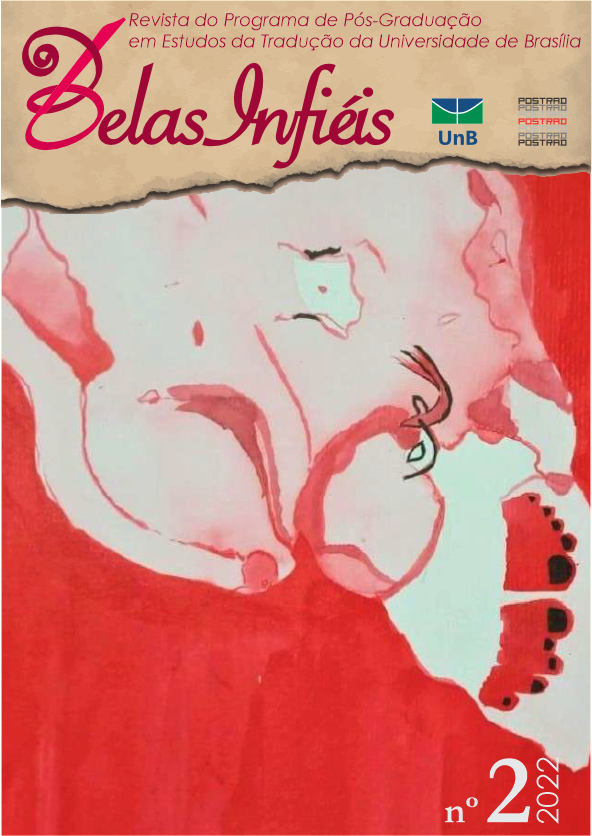Sycorax Collective: the Unfoldings of Feminist Translation Practices
DOI:
https://doi.org/10.26512/belasinfieis.v11.n2.2022.41253Keywords:
Feminist translation. Collective translation. Commoning translation. Commons. Activism.Abstract
The Brazilian translation collective, Coletivo Sycorax, was founded in 2016, aimed at collectively translating feminist and anti-capitalist books, while promoting the circulation of translated works under open licenses and the distribution of physical copies for free. For the Coletivo, translation encompasses both the action of introducing selected works into Brazilian Portuguese, in a way that “approximates” or “makes them seem closer” to our current context, in addition to promoting workshops and other activities based on our translations. This text has four sections and reports on projects, which have emphasized cooperation and network-building that are at the core of collective translation. The first section addresses the translation into Brazilian Portuguese of Caliban and the Witch (2004) and Revolution at Point Zero (2012), both by Silvia Federici. The second reports on the experience of translating Re-enchanting the World (2018), also by Silvia Federici, with twenty other feminist translators in 2020, during the Covid-19 pandemic. The third section addresses the translation of Patriarchy and Accumulation on a World Scale (1986), by Maria Mies, in 2021; a project which represented an additional step toward directly negotiating royalties and translation rights to ensure open access to the translation. Finally, section four reports on the most recent project: an anthology of Latin American women and feminisms, in cooperation with Revista Amazonas and Ema Livros. Therefore, we aim to show how a number of feminist practices have unfolded from translation practice, which in turn has shifted from a collective translation practice to a commoning one.
Downloads
References
Cabnal, Lorena. (2020). Defensa y recuperación del territorio de la sanación ancestral originaria. Pikara Magazine. https://www.pikaramagazine.com/2020/02/defensa-y-recuperacion-del-territorio-de-la-sanacion-ancestral-originaria/
Federici, Silvia. (2004). Caliban and the witch: Women, the body and primitive accumulation. Autonomedia.
Federici, Silvia. (2012). Revolution at Point Zero: Housework, Reproduction, and Feminist Struggle. PM Press.
Federici, Silvia. (2018). Re-enchanting the World: Feminism and the Politics of Commons. PM Press.
Federici, Silvia. (2017). Calibã e a bruxa: mulheres, corpo e acumulação primitiva (Coletivo Sycorax, Trad.). Editora Elefante.
Federici, Silvia. (2019). O ponto zero da revolução: trabalho doméstico, reprodução e luta feminista (Coletivo Sycorax, Trad.). Editora Elefante.
Federici, Silvia. (2022). Reencantando o mundo. Feminismo e a política dos comuns (Coletivo Sycorax, Trad.). Editora Elefante.
Federici, Silvia, & Fortunati, Leopoldina. (1984). Il Grande Calibano: Storia del corpo sociale ribelle nella prima fase del capitale. Franco Angeli.
Fonseca, Luciana. C., Silva, Liliam. R., & Silva-Reis, Dennys. (2020). Apontamentos basilares para os estudos da tradução feminista na América Latina. Mutatis Mutandis. Revista Latinoamericana de Traducción, 13(2), 210–227. https://revistas.udea.edu.co/index.php/mutatismutandis/article/view/343437/20803720
Godayol, Pillar. (2011). “I like Women”: Regarding feminine affinities in translation. In Luise von Flotow (Org.), Translating women (pp. 119–134). University of Ottawa Press.
Haraway, Donna. (1988). Situated Knowledges: The Science Question in Feminism and the Privilege of Partial Perspective. Feminist studies, 14(3), 575–599.
Hayashida, Jennifer. (2020). Solidarity in Translation – Translation in Solidarity. In Glossary of Common Knowledge. Moderna Galerija. https://glossary.mg-lj.si/referential-fields/commons-solidarity/translation-3
Hiršenfelder, Ida. (Org.). (2018). Glossary of Common Knowledge. Moderna Galerija. https://glossary.mg-lj.si/about-gck
Maldonado-Torres, Neslon. (2008). A topologia do ser e a geopolítica do saber. Modernidade, império e colonialidade (Inês Martins Ferreira, Trad.). Revista Crítica de Ciências Sociais, (80), 71–114. (Originalmente publicado em 2006, The Topology of Being and the Geopolitics of Knowledge. Modernity, Empire, Coloniality)
Marx, Karl. (2017). O capital: crítica da economia política: livro I: o processo de produção do capital (Rubens Enderle, Trad.). Boitempo Editorial. (Originalmente publicado em 1867, Das Kapital. Kritik der politischen Oekonomie)
Mies, Maria. (2022). Patriarcado e acumulação de capital em escala mundial. Mulheres na divisão internacional do trabalho. Ema Livros/Timo.
Mies, Maria. (1986). Patriarchy and Accumulation on a World Scale. Women in the International Division of Labour. Zed Books.
Moraga, Cherríe, & Castillo, Ana. (Eds.) (1988). Esta puente mi espalda. Voces de mujeres tercermundistas en los Estados Unidos. ISM Press.
Quijano, Aníbal. (2000). Colonialidad del poder, eurocentrismo y América Latina. In Edgardo Lander (Org.), La colonialidad del saber: eurocentrismo y ciencias sociales (pp. 122–151). Perspectivas latinoamericanas. CLACSO/UNESCO.
Rosas, Cecília, Bittencourt, Juliana, Izidoro, Leila G., & Oliveira-Macedo, Shisleni. (2020). Conjurando traduções: a tradução coletiva de ‘Calibã e bruxa’ para o português brasileiro como estratégia feminista transnacional. Mutatis Mutandis. Revista Latinoamericana de Traducción, 13(1), 117–138.
Santos, tatiana. (2014). Letramento e tradução no espelho de Oxum: teoria lésbica negra em auto/re/conhecimento [Tese de doutorado, Universidade Federal de Santa Catarina]. https://repositorio.ufsc.br/bitstream/handle/123456789/128822/331961.pdf?sequence=1
Segato, Rita Laura. (2013) La crítica de la colonialidad en ocho ensayos y una antropología por demanda. Prometeo Libros.
Teles, Maria Amélia. A. (1993). Breve história do feminismo no Brasil. Ed. Brasiliense.
Walsh, Catherine. (2013). Lo pedagógico y lo decolonial: entretejiendo caminos. In Catherine Walsh (Org.), Pedagogías decoloniales: Prácticas insurgentes de resistir, (re)existir y (re)vivir (pp. 23–68). Ediciones Abya-Yala.
Downloads
Published
How to Cite
Issue
Section
License
Copyright (c) 2022 CC BY

This work is licensed under a Creative Commons Attribution 4.0 International License.
Given the public access to this journal, the texts are free to use but requires the recognition of the original authorship and initial publication in this journal to be properly stated.
 The journal allows the use of works published for non-commercial purposes, including the right to submit the work to publicly accessible databases. Published contributions are the sole and exclusive responsibility of the author(s).Â



















